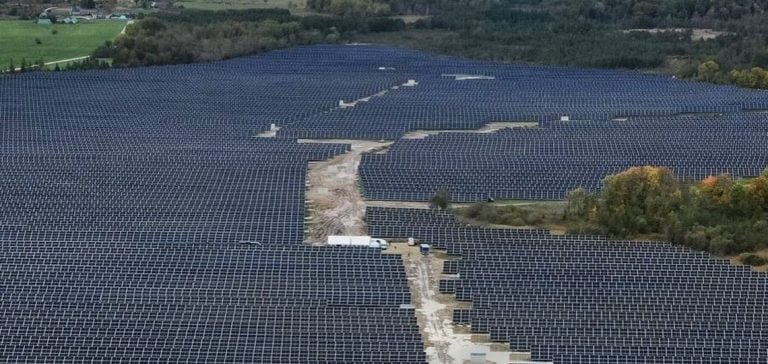The Estonian energy company Evecon and Mirova, an asset manager dedicated to sustainable finance, inaugurated the Kirikmäe Solar Park, the largest in the Baltic states, located in Kirikmäe, Pärnu County. Spanning nearly 110 hectares, the park has a production capacity of 77.53 MW, more than twice that of the largest existing solar park in Estonia. This facility covers the estimated annual energy needs of 35,000 households. The Kirikmäe Park is owned by the Baltic Renewable Energy Platform (BREP), a joint venture established by Evecon and Mirova in December 2022, aimed at financing, constructing, and operating a portfolio of over 100 MWp of solar parks in Estonia.
This event marks a significant milestone for the Baltic region, both in terms of the size of the production unit and the scale of the investment. “The construction of the Kirikmäe Solar Park is a landmark event for the entire Baltic region due to the size of the production unit and the scale of the investment,” said Karl Kull, CEO of Evecon. “With the addition of the Imavere and Lohu Mets solar parks, inaugurated by Evecon and Mirova just a few days ago, more than 100 MW of production capacity will be added to the local market within one week. This represents about one-tenth of the total solar capacity currently produced in Estonia. We would like to thank Mirova for the success of this project and for trusting the Estonian renewable energy market.”
Rapid and Efficient Construction
According to Karl Kull, the Kirikmäe Solar Park was completed in six months, setting a speed record in solar park construction. “After preparing the solar park site, Wiso Engineering began construction work in April this year. It was a large-scale construction project with up to 250 workers on site at its peak,” he explained.
Evecon proposed a community benefit model to the municipality of Lääneranna in the form of a contract. This initiative is voluntary on the part of the company, as there is no provision for the payment of a tolerance fee in the case of solar energy production, unlike with wind turbines. “The municipality receives 0.6% of the revenues generated by the park,” Karl Kull specified. “I also wish to thank the municipality of Lääneranna, with whom our dealings went smoothly and whose attitude was favorable to the construction of such a large solar park in Kirikmäe.”
Commitment to Energy Transition
Raphael Lance, Head of Energy Transition Funds at Mirova, added: “The strategy of Mirova’s renewable energy funds has always been to participate in building new installed capacity alongside industrial partners and project developers in Europe. We are proud to contribute to the Baltics’ decarbonization and energy independence with this major asset and are grateful to our partner Evecon for the quality of our collaboration.”
Climate Minister Yoko Alender highlighted the rapid growth of solar energy in Estonia. “The use of solar energy has grown rapidly in Estonia. In 2020, we started with almost no capacity, and we now rank sixth in the European Union in terms of solar panel capacity per capita. Our goal is clear – by 2030, the electricity we consume must come from renewable sources. Solar energy, which currently also offers the most affordable electricity, makes an important contribution to achieving this goal.”
The Kirikmäe Solar Park, covering an area of 110 hectares, will equip 117,600 solar panels with a total power of 655–665 W each, manufactured by Canadian Solar. This infrastructure not only supports national energy objectives but also strengthens Estonia’s position as a leader in renewable energy within the European Union.






















